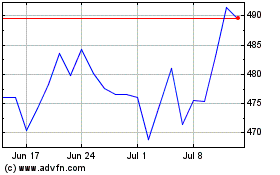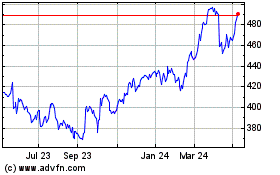Aviva Plans to Shrink in Order to Grow in Investment Management -- Financial News
June 21 2021 - 5:39AM
Dow Jones News
By David Wighton
Of Financial News
What is Aviva PLC going to do about its underperforming Aviva
Investors asset management arm, demanded Philip Meadowcroft at the
insurance giant's annual meeting last month. Given its lack of
scale and tiny contribution to group profits, shouldn't Aviva just
sell it, asked the campaigning private investor, who has been
harrying Aviva's management for years.
Now Mr. Meadowcroft has got an answer. Of sorts. Aviva has
confirmed that it is cutting back the equities operation, with
David Cumming, the high-profile chief investment officer for
equities, the first of several heads to roll. Eight to 10 funds are
expected to be closed.
Yet Aviva has also reaffirmed its strategic commitment to the
business and expressed its "full confidence" that it can deliver
further growth in the areas it has retained.
Mr. Meadowcroft is unconvinced. And he isn't alone. Senior
industry figures believe something more radical is required. Some
suggest Aviva should emulate Dutch insurer NN Group NV, which is
"reviewing strategic options" for its 300 billion euros ($355.9
billion) asset investment manager and is reported to have received
offers from UBS Group AG, Allianz SE, Assicurazioni Generali SpA
and DWS Group GmbH & Co. KGaA.
The move comes as NN is under pressure to boost shareholder
value from Elliott Management Corp., the activist investor that
revealed a stake last year. Aviva is also under fire from an
activist, Cevian, which has just revealed a 5% stake and is
pressing for big cost reductions.
However, it seems unlikely that any changes at Aviva Investors
will be the result of pressure from Cevian, if only because the
business is such a small part of the group. It contributed only 3%
of group profits last year--or less than 2% if you strip out the
French operation, which is being sold. So even radical changes at
Aviva Investors would make little difference in group terms.
Some observers believe its relative size may partly explain why
Aviva Investors' performance has been as disappointing as its
parent's in recent years.
The challenge has been to attract more assets from external
clients alongside the business it does for Aviva companies. Many
insurer-owned asset managers have found this difficult, not least
because the safety-first approach of investing for insurers can be
tricky to translate into the more freewheeling world of third-party
investment management. "The DNA is very different," says Jonathan
Doolan, European head of asset management at consultant Casey
Quirk.
The gathering of external assets has tended to be more
successful when the investment manager is a big part of the group,
such as at Allianz. Where it is relatively small, efforts to
diversify are sometimes hampered by group management, who fear it
will divert attention from its core job of serving the insurance
company in return for potential growth that wouldn't "move the
needle" in group terms.
It is unclear whether this has been a factor in the Aviva case,
though former boss Euan Munro is known to have had a few struggles
with the board. He left in January after seven years during which
the business made much progress but ultimately delivered
disappointing results.
On the surface, Aviva Investors has a lot going for it. It has a
good line-up of products in sought-after areas, and it was a
pioneer of environmental, social and governance investing,
introducing the U.K.'s first ethical fund range back in 1984. It
also has the opportunity to cross-sell its products into the huge
insurance customer base, a strategy being pursued effectively by
rival M&G PLC/Prudential PLC.
Yet Mr. Munro never got close to the target of 30% of assets
from external clients. At the end of last year, the proportion was
a little over 20% of 366 billion pounds ($505.19 billion). From
these, it generated operating profits of GBP85 million, of which
GBP33 million (after tax) came from the French business. About
GBP105 billion of assets will go with the French sale, leaving
Aviva Investors with about GBP260 billion.
Mr. Meadowcroft claims that part of the reason Aviva Investors'
profits are so meager is that it charges internal clients roughly
half the rate it would get in the open market, a figure the company
disputes. What isn't in doubt is that Aviva would have to pay a
great deal more if it had to buy asset management services from a
third party, so hiving off Aviva Investors wouldn't help it meet
the cost cutting demands of Cevian.
In any case, Aviva's Chief Executive Amanda Blanc has made it
clear that Aviva Investors is a core business. It is conceivable
that to achieve the greater scale that is seen as so important in
asset management these days, Aviva could try to put Aviva Investors
into a joint venture with another insurer. But the likelihood is
that Aviva Investors' new boss, Mark Versey, will just be expected
to succeed where Mr. Munro failed--with a much smaller
business.
It won't be easy. And he can certainly expect more waspish
interventions from Mr. Meadowcroft along the way.
Website: www.fnlondon.com
(END) Dow Jones Newswires
June 21, 2021 05:26 ET (09:26 GMT)
Copyright (c) 2021 Dow Jones & Company, Inc.
Aviva (LSE:AV.)
Historical Stock Chart
From Mar 2024 to Apr 2024

Aviva (LSE:AV.)
Historical Stock Chart
From Apr 2023 to Apr 2024
